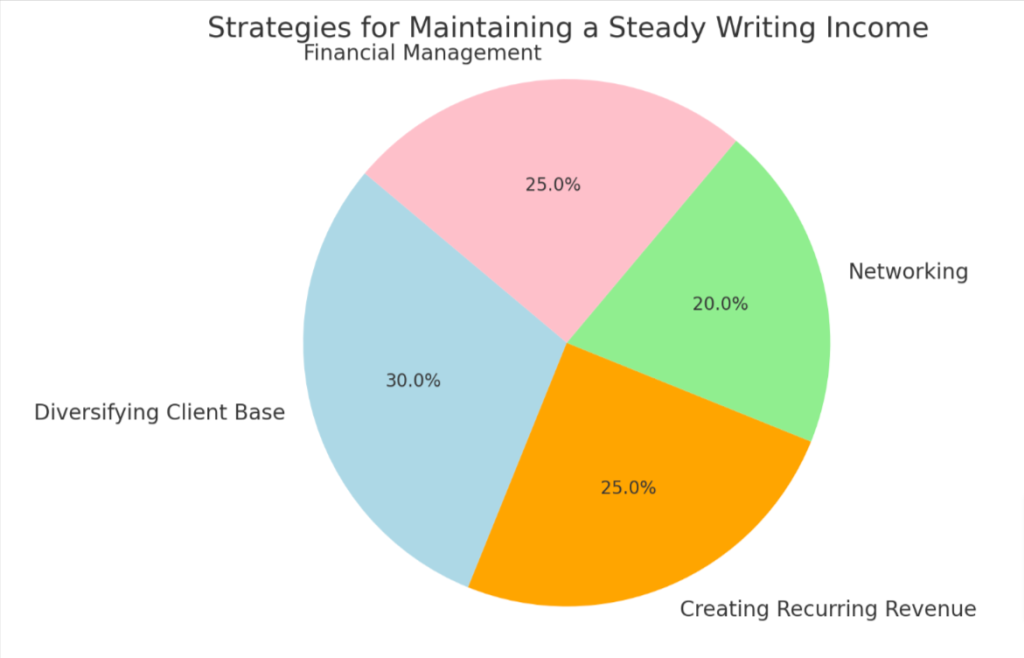Achieving Financial Balance: Sustaining Your Writing Income
Venturing into the world of freelance writing can be exhilarating, but also fraught with financial instability. Many fresh and even seasoned freelancers grapple with the feast or famine cycle, where one month is a banquet of writing gigs while another may feel like a desert.
In this article, we’ll delve into effective strategies to maintain steady income from your writing passion by diversifying client bases, fostering strong client relationships and managing finances smartly.
Ready for stability? Let’s dive in!
Key Takeaways
- Build a diverse client base by seeking clients in various industries, aiming for a mix of long-term contracts and one-off projects, networking actively, considering international clients, regularly assessing profitability, and being open to new partnerships or collaborations.
- Create recurring revenue streams through subscription-based services or products, retainer agreements with clients, membership sites, online courses with ongoing support and updates, passive income streams like e-books or templates, and affiliate partnerships.
- Network and build relationships by attending events and conferences, joining online communities and social media groups, reaching out to past clients for referrals or recommendations,
- Manage freelance writing finances by setting clear financial goals,
The Feast or Famine Cycle of Freelance Writing
Freelance writers often experience the feast or famine cycle, facing financial instability and struggling to maintain a steady income.
Financial instability and its impact on writers
Financial instability often poses a profound challenge for writers. It can disrupt their creative process, creating unwelcome stress and distractions as they scramble to manage irregular income streams.
Some writers may even be forced to take on less satisfying projects just to pay the bills, which could lead to burnout over time. Furthermore, financial insecurity can discourage potential talents from starting a writing career due to fear of not being able to make ends meet consistently.
The struggle with inconsistent earnings is real and impacts both the personal lives and professional growths of many freelancers in the writing profession.
The common struggle of feast or famine
Freelance writers often face a challenging cycle of feast or famine. This term represents the ups and downs in income that many freelancers know all too well. In “feast” periods, work is abundant, leading to substantial earnings.
Conversely, during “famine” episodes, assignment opportunities dry up, causing financial stress.
This erratic pattern can cause severe anxiety and uncertainty for freelance writers. Without reliable income streams, issues like paying bills on time or planning for future expenses become significantly more complicated.
The lack of predictable revenue makes achieving financial stability an elusive goal for most freelancers trying to escape the freelancer’s feast and famine cycle.
Strategies for Maintaining a Steady Flow of Work
Diversify your client base, create recurring revenue streams, network and build relationships, and utilize freelance platforms to ensure a steady flow of work.
Diversify client base
Building a diverse client base can be an effective strategy to stabilize your freelance writing income. Here are some valuable approaches:
- Seek out clients in various industries. It opens up more opportunities and keeps your work interesting.
- Aim for a mix of long-term contracts and shorter, one-off projects. This provides both stability and flexibility.
- Network actively, both online and offline, to continuously add new potential clients to your pipeline.
- Consider working with international clients. Different time zones can fill in work gaps.
- Regularly assess the profitability of each client relationship. Let go of low – paying clients who demand too much time.
- Always be on the lookout for potential new partnerships or collaborations that could lead to more work.
Create recurring revenue streams
To maintain a steady writing income, it is important to create recurring revenue streams. This will ensure a consistent flow of work and financial stability. Here are some strategies to consider:
- Offer subscription-based services or products: Develop a monthly or yearly subscription option for your writing services or create digital products that customers can purchase on a recurring basis.
- Seek retainer agreements with clients: Negotiate contracts with clients that guarantee a set amount of work each month, providing you with a steady income.
- Start a membership site: Create an exclusive membership site where subscribers can access premium content, resources, or personalized coaching from you on a monthly or yearly basis.
- Launch an online course: Share your expertise by creating an online course that people can enroll in for a fee. Offer ongoing support and updates for participants to encourage recurring enrollment.
- Develop passive income streams: Create and sell e-books, templates, or other digital products that generate passive income over time without requiring constant effort on your part.
- Build affiliate partnerships: Recommend products or services you believe in and earn commissions for every sale generated through your unique referral link.
Network and build relationships
Build a strong network and foster relationships in order to maintain a steady flow of work and income. Here are some strategies to help you connect with potential clients and build lasting professional relationships:
- Attend networking events, industry conferences, and workshops to meet other writers, editors, publishers, and professionals in your field.
- Join online forums, social media groups, and writing communities to connect with fellow freelancers and potential clients.
- Reach out to past clients or colleagues for referrals or recommendations.
- Collaborate with other writers on projects or pitch ideas for joint ventures.
- Offer your services as a guest blogger or writer for publications in your niche.
- Engage with your audience on social media platforms by responding to comments, sharing useful information, and participating in relevant discussions.
- Attend local meetups or writing groups to network with like – minded individuals.
Utilize freelance platforms
Freelance platforms can be a valuable resource for writers looking to maintain a steady flow of work. Here are some ways to utilize these platforms effectively:
- Create a compelling profile that highlights your skills and experience.
- Regularly update your portfolio with your best work.
- Constantly search for new job postings and submit tailored proposals.
- Take advantage of the rating and review system to build a strong reputation.
- Network with other freelancers on the platform for potential collaboration opportunities.
- Stay active on the platform by regularly bidding on projects and participating in discussions.
Tips for Generating Monthly Recurring Revenue
Landing higher-paying gigs and fostering meaningful relationships with clients are just a few strategies that can help freelance writers generate monthly recurring revenue. Find out how to secure a steady stream of income in the competitive writing industry.
The benefits of recurring revenue
Recurring revenue is a game-changer for freelance writers. By securing ongoing projects and clients, you can enjoy a steady stream of income instead of constantly searching for new gigs.
Not only does this provide stability, but it also allows you to better plan financially and reduce the stress of the feast or famine cycle. With recurring revenue, you can focus on delivering high-quality work consistently while building long-term relationships with clients that can lead to even more opportunities in the future.
How to land higher-paying gigs
To land higher-paying gigs, take the following steps:
- Showcase your expertise: Highlight your skills and experience in your portfolio or resume to stand out to potential clients.
- Research the market rates: Find out what other writers are charging for similar projects to ensure you are pricing yourself competitively.
- Build a strong online presence: Create a professional website and maintain active social media profiles to increase your visibility and attract high-paying clients.
- Network with industry professionals: Attend conferences, join writing communities, and connect with influential individuals who can refer you to lucrative opportunities.
- Cultivate relationships with existing clients: Deliver exceptional work, meet deadlines consistently, and proactively communicate with clients to establish trust and secure repeat business.
- Perfect your pitch: Craft compelling proposals tailored to individual clients’ needs, emphasizing the value you bring to their projects.
- Leverage testimonials and referrals: Encourage satisfied clients to provide testimonials that highlight the quality of your work, which can help you attract higher-paying gigs.
Foster meaningful relationships with clients
Building strong and meaningful relationships with clients is crucial for maintaining a steady writing income. Here are some strategies to foster these relationships:
- Communicate regularly and proactively with clients
- Provide exceptional customer service and go the extra mile
- Show genuine interest in their projects and goals
- Deliver high – quality work consistently
- Be responsive and meet deadlines promptly
- Seek feedback and make improvements based on client preferences
- Offer loyalty discounts or incentives for repeat business
- Stay updated on industry trends and share relevant insights with clients
How to Manage Your Freelance Writing Finances
Manage your freelance writing finances by setting clear financial goals and creating a detailed budget to track your income and expenses. Understand the process of invoicing and payment tracking, while also staying on top of your tax obligations.

Utilize helpful financial tools and apps to streamline your financial management, and make sure to build an emergency fund for unexpected expenses.
Setting financial goals and creating a budget
Setting financial goals and creating a budget are essential steps to maintaining a steady writing income. Here’s how you can achieve financial stability as a freelancer:
- Determine your income target: Set realistic financial goals that align with your needs and aspirations. Consider factors like monthly expenses, debt payments, and savings to define your income target.
- Track your earnings: Keep a record of your monthly income from various writing projects. This will help you assess if you’re meeting your income goals or if adjustments need to be made.
- Create a budget: Develop a detailed budget that outlines your fixed expenses (rent, utilities) and variable expenses (groceries, entertainment). Allocate an amount for savings each month.
- Prioritize essential spending: Differentiate between necessary and discretionary expenses. Focus on meeting essential needs before indulging in non-essential purchases.
- Save for taxes: As a freelancer, it’s important to allocate a portion of your earnings towards taxes. Set aside money regularly to avoid any unexpected tax burdens at the end of the year.
- Plan for emergencies: Build an emergency fund to cover unforeseen circumstances such as project delays or personal emergencies. Aim to save at least three to six months’ worth of living expenses.
Understanding invoicing and payment tracking
Understanding invoicing and payment tracking is crucial for maintaining a steady writing income. Here are some key tips to help you:
- Keep detailed records of all your projects, including the client’s name, project details, and payment terms.
- Create professional invoices that clearly state your services, rates, and payment due date.
- Use online invoicing tools or software to automate the process and ensure accuracy.
- Set reminders for pending payments to avoid delays or missed deadlines.
- Track incoming payments to monitor your cash flow and identify any late payments.
- Follow up on overdue invoices with polite reminders and escalate if necessary.
- Consider offering various payment options to accommodate different clients’ preferences.
- Regularly review your invoicing system for efficiency and make adjustments as needed.
Managing expenses and tax obligations
Managing expenses and tax obligations is crucial for maintaining a steady writing income. Here are some tips to help you stay on top of your finances:
- Track your expenses diligently.
- Keep records of all business – related receipts and invoices.
- Separate your personal and business expenses.
- Stay organized with a system for tracking and categorizing expenses.
- Set aside money for taxes regularly, rather than waiting until the last minute.
- Consider hiring a professional accountant to assist with tax preparation.
- Stay informed about tax laws and deductions that apply to freelance writers.
- Create a budget that incorporates both personal and business expenses.
- Review your budget regularly to identify areas where you can cut costs or save money.
- Explore tax – saving strategies such as deducting home office expenses or using a portion of your rent or mortgage as a deduction.
Utilizing financial tools and apps
Take control of your freelance writing finances by utilizing helpful financial tools and apps. These resources can streamline your invoicing, payment tracking, and expense management. They can also provide insights into your overall financial health and help you build an emergency fund. Consider using popular financial tools such as QuickBooks or FreshBooks to easily create invoices and track payments.
Use expense tracker apps like Expensify or PocketGuard to monitor your spending and identify areas where you can cut back. Take advantage of these tools to ensure a steady and stable income for your freelance writing business.
Building an emergency fund.
Building an emergency fund is essential for freelance writers to maintain financial stability. Here are some steps to help you establish your emergency fund:
- Set a monthly savings goal: Determine how much you want to save each month and make it a priority in your budget.
- Track your expenses: Keep a close eye on your spending habits and identify areas where you can cut back to allocate more money towards your emergency fund.
- Automate savings: Set up automatic transfers from your checking account to your emergency fund so that you consistently contribute without having to think about it.
- Start small: Begin by saving smaller amounts and gradually increase the amount over time as you become more financially stable.
- Prioritize savings over unnecessary purchases: Instead of splurging on non-essential items, redirect that money towards your emergency fund.
- Explore side gigs or additional income sources: Consider taking on extra freelance projects or exploring other avenues for earning income to boost your emergency fund faster.
- Keep it separate: Open a separate bank account specifically for your emergency fund to prevent any temptation to use the money for non-emergency expenses.
- Don’t touch it unless absolutely necessary: Reserve your emergency fund for true emergencies, such as unexpected medical bills or car repairs, rather than dipping into it for everyday expenses.

Conclusion
Maintaining a steady writing income is crucial for freelancers to escape the dreaded feast or famine cycle. By diversifying your client base, creating recurring revenue streams, networking and utilizing freelance platforms, you can reduce financial stress and achieve stability in your writing career.
Take control of your finances by setting goals, managing expenses, tracking payments and building an emergency fund. With these strategies in place, you can enjoy consistent income and peace of mind as a freelance writer.

